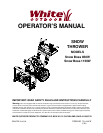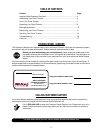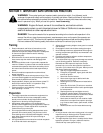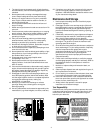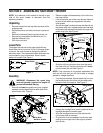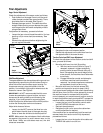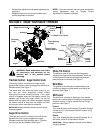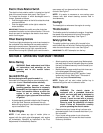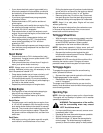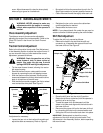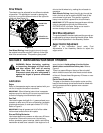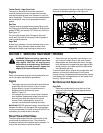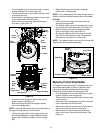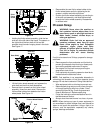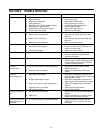
9
• If your home electrical system is grounded, but a
three-hole receptacle is not available, one should
be installed by a licensed electrician before using
the electric starter.
• If you have a grounded three-prong receptacle,
proceed as follows:
• Rotate choke knob to OFF position and do not
prime engine.
• Connect power cord to switch box on engine. Plug
the other end of power cord into a three-hole,
grounded 120 volt AC receptacle.
• Push starter button on top of the engine to crank
engine. As you crank the engine, move choke knob
to FULL choke position.
• When engine starts, release starter button, and
move choke gradually to OFF. If engine falters,
move choke immediately to FULL and then
gradually to OFF.
• When disconnecting the power cord, always unplug
from the three-prong receptacle first and then from
the snow thrower.
Recoil Starter
• Rotate choke knob to FULL choke position (cold
engine start). If engine is warm, place choke in OFF
position instead of FULL.
• Push primer button two or three times. If engine is
warm, push primer button once only.
NOTE: Always cover vent hole in primer button when
pushing. Additional priming may be necessary for first
start if temperature is below 15°F.
• Grasp starter handle and pull rope out slowly, until
it pulls slightly harder. Let rope rewind slowly.
• Pull starter handle rapidly. Do not allow handle to
snap back. Allow it to rewind slowly while keeping a
firm hold on the starter handle.
• Repeat the previous steps until engine starts.
To Stop Engine
• Run engine for a few minutes before stopping to
help dry off any moisture on the engine.
• To help prevent possible freeze-up of starter,
proceed as follows.
Electric Starter:
• Connect power cord to switch box on engine, then
to 120 volt AC receptacle. With the engine running,
push starter button and spin the starter for several
seconds. The unusual sound made by spinning the
starter will not harm engine or starter. Disconnect
the power cord from receptacle first, and then from
switch box.
Recoil Starter
• With engine running, pull starter rope with a rapid,
continuous full arm stroke three or four times.
Pulling the starter rope will produce a loud clattering
sound, which is not harmful to the engine or starter.
• Move throttle control to “stop” or “off” position.
• Remove ignition key. Do not turn key. Disconnect
the spark plug wire from the spark plug to prevent
accidental starting while equipment is unattended.
NOTE: Keep it in a safe place. Engine will not start
without ignition key.
Wipe all snow and moisture from the carburetor cover
in the area of the control levers. Also, move control
levers back and forth several times.
To Engage Wheel Drive
• With the engine running near top speed, move the
shift lever into one of the six FORWARD positions
or two REVERSE positions. Select a speed
appropriate for the snow conditions that exist.
NOTE: Use slower speeds in higher snow, and until
you are familiar with the operation of the snow thrower.
• Squeeze the traction control against the right
handle and the snow thrower will move. Release it
and the drive motion will stop.
IMPORTANT:
NEVER move the shift lever without first
releasing the traction control. Doing so will cause
premature wear to the drive system’s friction wheel.
To Engage Augers
To engage the augers and start the snow throwing
action, proceed as follows:
• Squeeze the auger control against the left handle.
To disengage power to the augers:
• Release both the auger control and the traction
control, if engaged.
The auger control can be locked so you can turn the
electric chute directional control without interrupting the
snow throwing process.
Operating Tips
NOTE: Allow the engine to warm up for a few minutes.
The engine will not develop full power until it reaches
operating temperature.
WARNING: The temperature of the muffler
and the surrounding areas may exceed
150
°
F. Avoid these areas.
• For the most efficient snow removal, remove snow
immediately after it falls.
• Discharge the snow downwind whenever possible.
• Slightly overlap each previous path.
• Set the skid shoes 1/4" below the shave plate for
normal usage. The skid shoes may be adjusted
upward (to lower the shave plate) for hard-packed



